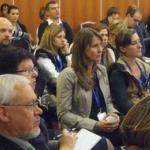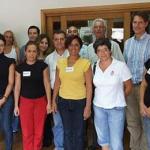Representatives from a total of 22 non-governmental organizations in Izmir and surrounding provinces attended the seminar. The discussions focused on the public relations and media relations practices of rights organizations, and the research and reporting methods of NGOs. The seminar was made up of presentations, workshops and discussions.
NGO Project Advisor Fugen Ugur, Communications expert Ergun Gumrah from Leo PR, NGO expert Sinan Gokcen from the Helsinki Citizens Assembly and Erol Onderoglu, who is responsible for the BIA ² Media Monitoring Desk, attended the seminar as instructors.
The fourth of the training program will be held in Istanbul on May 7-8.
Ugur: NGOs should be transparent and democratic
Fugen Ugur, during her presentation on "The Notion of Rights Organizations, Examples from the World and Advocating, Public Relations Practices," examined rights organizations, NGOs on a conceptual level and said that the range of influence of these organizations are widening.
Ugur underlined that NGOs can put pressure on governments especially in the field of human, women's and children's rights and get positive results. She said such organizations are advocating social responsibility in the face of multinational companies and are improving and changing the codes of behavior.
Ugur also listed some of the criticisms directed to NGOs:
* Their financial resources are not transparent,
* They have a bureaucratic structure; there is not democracy within the organization,
* They are not open to criticism,
* They can engage in commercial activities and act as companies,
* They don't take into account the various outcomes of their activities.
Ugur suggested the following in the face of criticisms:
* Being open, transparent and accountable,
* Having a democratic structure,
* Announcing financial resources and being able to defend,
* Being able to foresee the outcomes of decisions and activities and being able to defend.
Gumrah: The important thing is to convey the message
Ergun Gumrah from Leo PR, during his presentation on "Relations with the Media," talked about the foundations the NGOs should base their relations with the media on.
Gumrah said the important thing is to be able to convey the message, not to be in the media. He stressed that most of the time the message is shadowed by the activity itself.
Gumrah talked about the importance of research, planning, implementation and evaluation in relations with the media and added that good planning is necessary for successful communications.
Gumrah also said that in this environment of mass information, there is need to differentiate oneself to be able to convey the message successfully.
Gokcen: Rights organizations should know the media well
NGO expert Sinan Gokcen from the Helsinki Citizens Assembly also talked about strategies and methods the rights organizations should use in their relations with national or local media, drawing the media's attention in rights activities or rights violations, and strategies on ensuring follow-up stories.
Gokcen said the rights organizations should look for ways to establish an egalitarian relationship with the media. Gokcen advocated that organized movements can change the media, and 'correct' the media especially in terms of rights violations. He said the NGOs should know the media very well in especially two aspects to be able to communicate successfully through the media:
1. The capital/patron relations in the media
2. Which editor deals with which issue
Gokcen said the material by the rights organizations should include the following characteristics to find a place in the media:
Striking, timeliness, new or first, unexpected
Later, Ergun Gumrah, talked about the "Silent Shoes" campaign by the Hope Foundation as a good example of using different channels.
On the second day of the seminar, the participants attended workshops where they evaluated the presentations. The participants, in groups, planned and presented a campaign each. Gokcen, during these activities, underlined the importance of the language used by the rights organizations and said "We can train the media through the language we use."
Onderoglu: Right to access information is very valuable
Erol Onderoglu, who is responsible for BIA² Media Monitoring Desk, talked about the research and reporting methods for rights organizations.
Onderoglu listed argument, vehicles, findings and conclusion as the steps of research based on an allegation. He underlined the importance of archive studies and the right to access information.
Onderoglu also talked about the methods of interviewing victims and their relatives. He summed up the research reporting system as follows:
* The social and legal dimension of the problem
* Information and allegation
* Accounts by the relatives of the victims and the witnesses
* What do those who are being accused have to say?
* What do we have on the table?
* Referring to national and international laws through the violation
* What do we want (Listing of the demands)
The media should be more conscious about rights
At the end of the seminar, the participants evaluated the two-day training. The participants said that they realized their methodical shortcomings in their relations with the media and added the technical information in tips were very useful. They also said that the media should be more conscious about rights and stressed that the rights organizations also need to work toward that.
The participants underlined that they had grasped the importance of certain points, which they disregarded in their relations with the media.
They added that bianet is a valuable means for the rights organizations in their communications and said they see bianet as the correct source of information. (TK/EA/YE)












